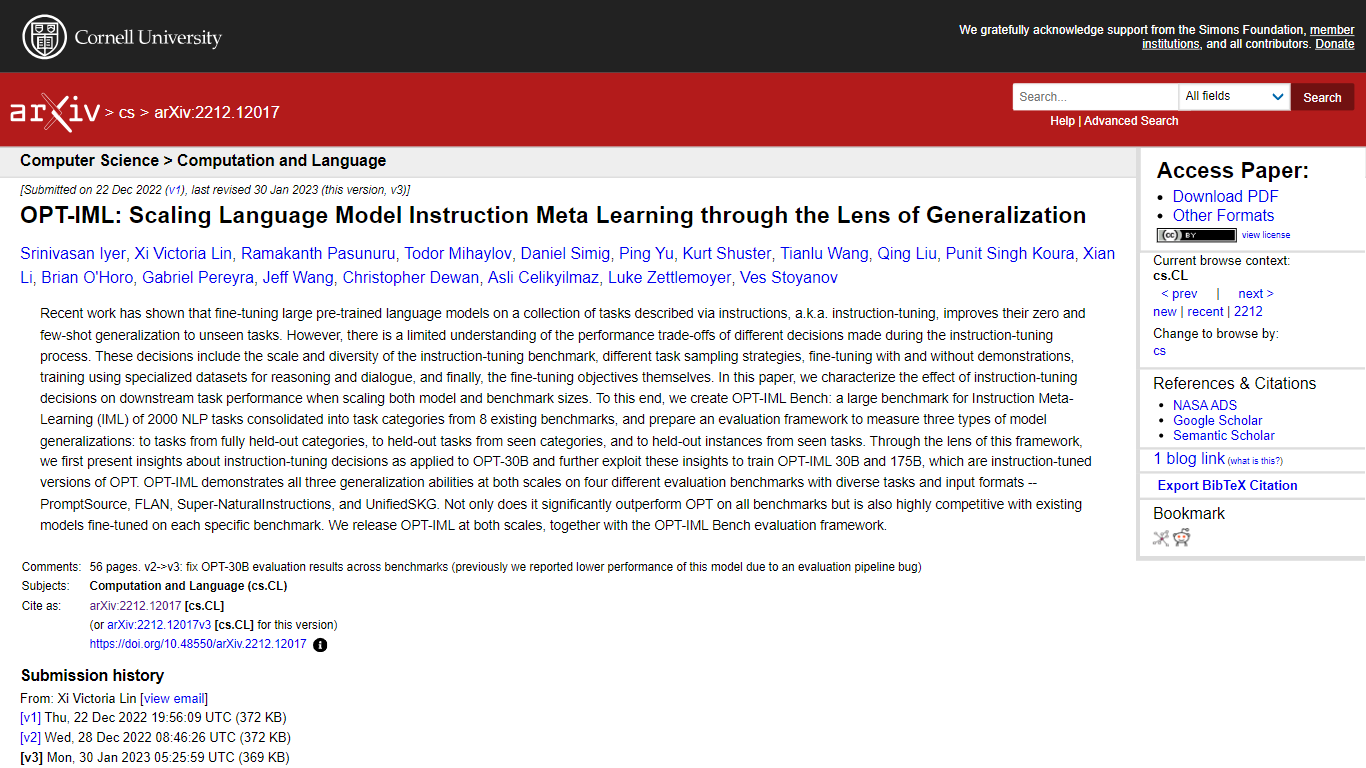OPT-IML vs ggml.ai
In the face-off between OPT-IML vs ggml.ai, which AI Large Language Model (LLM) tool takes the crown? We scrutinize features, alternatives, upvotes, reviews, pricing, and more.
When we put OPT-IML and ggml.ai head to head, which one emerges as the victor?
If we were to analyze OPT-IML and ggml.ai, both of which are AI-powered large language model (llm) tools, what would we find? The upvote count reveals a draw, with both tools earning the same number of upvotes. Be a part of the decision-making process. Your vote could determine the winner.
You don't agree with the result? Cast your vote to help us decide!
OPT-IML

What is OPT-IML?
The paper titled "OPT-IML: Scaling Language Model Instruction Meta Learning through the Lens of Generalization" focuses on fine-tuning large pre-trained language models with a technique called instruction-tuning, which has been demonstrated to improve model performance on zero and few-shot generalization to unseen tasks. The main challenge addressed in the study is grasping the performance trade-offs due to different decisions made during instruction-tuning, such as task sampling strategies and fine-tuning objectives.
The authors introduce the OPT-IML Bench—a comprehensive benchmark comprising 2000 NLP tasks from 8 different benchmarks—and use it to evaluate the instruction tuning on OPT models of varying sizes. The resulting instruction-tuned models, OPT-IML 30B and 175B, exhibit significant improvements over vanilla OPT and are competitive with specialized models, further inspiring the release of the OPT-IML Bench framework for broader research use.
ggml.ai

What is ggml.ai?
ggml.ai is at the forefront of AI technology, bringing powerful machine learning capabilities directly to the edge with its innovative tensor library. Built for large model support and high performance on common hardware platforms, ggml.ai enables developers to implement advanced AI algorithms without the need for specialized equipment. The platform, written in the efficient C programming language, offers 16-bit float and integer quantization support, along with automatic differentiation and various built-in optimization algorithms like ADAM and L-BFGS. It boasts optimized performance for Apple Silicon and leverages AVX/AVX2 intrinsics on x86 architectures. Web-based applications can also exploit its capabilities via WebAssembly and WASM SIMD support. With its zero runtime memory allocations and absence of third-party dependencies, ggml.ai presents a minimal and efficient solution for on-device inference.
Projects like whisper.cpp and llama.cpp demonstrate the high-performance inference capabilities of ggml.ai, with whisper.cpp providing speech-to-text solutions and llama.cpp focusing on efficient inference of Meta's LLaMA large language model. Moreover, the company welcomes contributions to its codebase and supports an open-core development model through the MIT license. As ggml.ai continues to expand, it seeks talented full-time developers with a shared vision for on-device inference to join their team.
Designed to push the envelope of AI at the edge, ggml.ai is a testament to the spirit of play and innovation in the AI community.
OPT-IML Upvotes
ggml.ai Upvotes
OPT-IML Top Features
Instruction-Tuning: Improvement of zero and few-shot generalization of language models via instruction-tuning.
Performance Trade-offs: Exploration of different decisions that affect performance during instruction-tuning.
OPT-IML Bench: Creation of a new benchmark for instruction meta-learning with 2000 NLP tasks.
Generalization Measurement: Implementation of an evaluation framework for measuring different types of model generalizations.
Model Competitiveness: Development of models that outperform OPT and are competitive with models fine-tuned on specific benchmarks.
ggml.ai Top Features
Written in C: Ensures high performance and compatibility across a range of platforms.
Optimization for Apple Silicon: Delivers efficient processing and lower latency on Apple devices.
Support for WebAssembly and WASM SIMD: Facilitates web applications to utilize machine learning capabilities.
No Third-Party Dependencies: Makes for an uncluttered codebase and convenient deployment.
Guided Language Output Support: Enhances human-computer interaction with more intuitive AI-generated responses.
OPT-IML Category
- Large Language Model (LLM)
ggml.ai Category
- Large Language Model (LLM)
OPT-IML Pricing Type
- Freemium
ggml.ai Pricing Type
- Freemium
